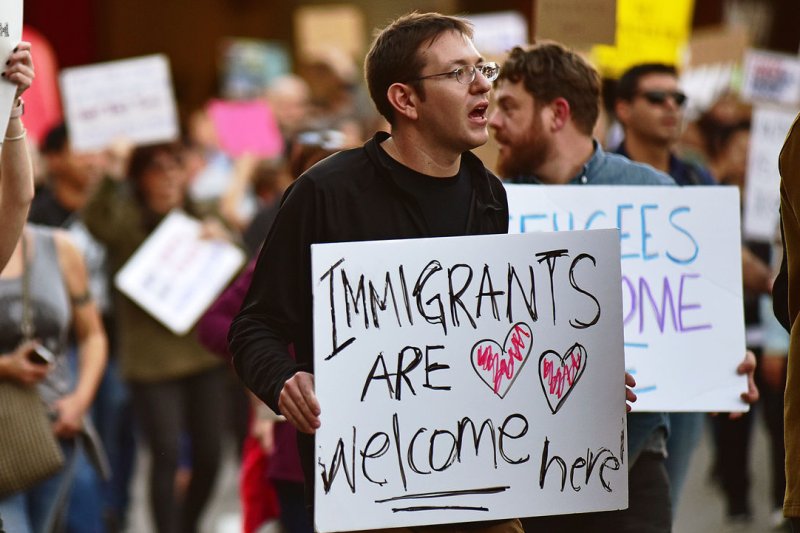Protesters rally against President Donald Trump's immigration order in front of the Tom Bradley Terminal at the Los Angeles International Airport on January 29. A federal judge in Hawaii expanded the family relationships exempt from Trump's revised travel ban. File Photo by Christine Chew/UPI |
License Photo
July 14 (UPI) -- A federal judge in Hawaii ruled more family members, like grandparents and grandchildren, should be exempt from President Donald Trump's temporary ban on refugees traveling to the United States.
U.S. District Court Judge Derrick Watson on Thursday said the government's interpretation of a Supreme Court ruling -- that those with a "credible claim of bona fide relationship" to someone in the United States should be allowed entry -- is too narrow. On June 26, the high court said it would review states' lawsuits against Trump's ban on refugees from six Muslim-majority countries, but that in the meantime, a limited version of the executive order would go into effect.
The U.S. State Department initially defined a "bona fide relationship" as one in which applicants could demonstrate a relationship with a parent, spouse, fiancee, child, adult son or daughter, son-in-law, daughter-in-law or sibling already in the United States. Earlier this month, Watson declined to expand the list of family relationships exempted from the ban.
But late Thursday, the judge determined more people should qualify -- including grandparents, grandchildren, brothers-in-law, sisters-in-law, aunts, uncles, nieces, nephews and cousins.
"The government's definition represents the antithesis of common sense," Watson wrote in his ruling. "Common sense, for instance, dictates that close family members be defined to include grandparents.
"Indeed grandparents are the epitome of close family members."
In March, Trump signed a revised travel ban months after federal judges blocked his first, ruling it likely violated the Constitution by disfavoring Muslims. The second order seeks to ban travel from Iran, Libya, Somalia, Sudan, Syria and Yemen for 90 days, and temporarily halt all refugee applications for 120 days.
Trump said the suspensions allow much-needed time to review the nation's immigration and refugee evaluation procedures to ensure potential terrorists aren't allowed to enter the country.
Trump's revised order dropped some of the most controversial elements of the first one. It removed Iraq from the list of nations excluded from immigration after the military said it threatened to sour relations with the country, which is leading efforts to fight the Islamic State in Iraq with the support of a U.S.-led international coalition.
The State Department said the United States admitted 50,086 refugees for the 2017 fiscal year, as of Wednesday, exceeding the 50,000-person cap for the year set by Trump. Though the quota has been reached for the fiscal year, which ends Sept. 29, those exempt from the limited executive order approved by the Supreme Court would still be allowed into the country.















